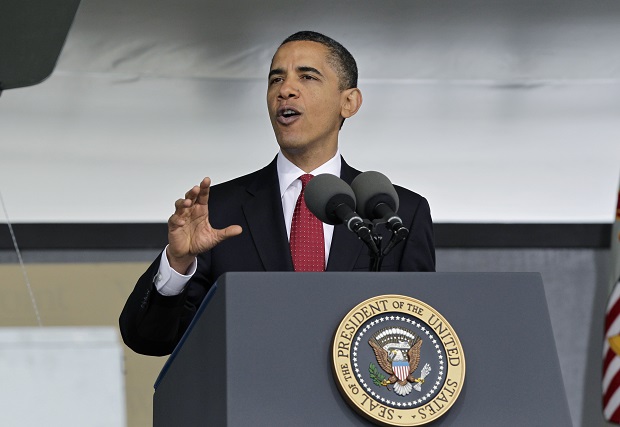Asia pivot absent from Obama foreign policy speech

In this May 22, 2010, file photo, addressing the graduates of the U.S. Military Academy, President Barack Obama outlined a foreign policy vision using diplomacy and a strong military together, in West Point, N.Y. Obama will soon outline a strategy for his final years in office that aims to avoid overreach as the second of the two wars he inherited comes to a close. The president will make the case for that seemingly more limited approach during a commencement address Wednesday, May 28, 2014, at the U.S. Military Academy at West Point. AP
WASHINGTON (AP) — President Barack Obama laid out a sweeping vision for US foreign policy but made no mention of what has been a signature tune of his administration’s diplomacy: the “pivot” to Asia.
The concept of the pivot was that as America wound down its involvement in wars in Afghanistan and Iraq that would free up military and diplomatic resources to focus on the Asia-Pacific, after a decade of relative neglect.
Yet in the president’s speech delivered Wednesday — a day after Obama outlined plans to get US forces out of Afghanistan by the end of 2016 — there was not a single reference to that shift in regional focus.
That was partly due to the purpose of the address. Obama was pushing back against critics who contend that his approach to global problems, such as Ukraine and Syria, has been too cautious and has emboldened adversaries.
He offered a broader perspective on the role that America should play in international affairs, still leading on the world stage and eschewing isolationism, but less ready to embark on military adventures.
But Obama made clear that the threat of terrorism that has preoccupied the US since the 9/11 attacks remains an abiding concern. He said as the US reduces its Afghan presence, it can do more to address emerging threats in the Middle East and North Africa.
It’s a far cry from the tone Obama struck in another keynote foreign policy speech he made in Australia in November 2011, where he declared that in the Asia-Pacific in the 21st century, “the United States of America is all in.”
Despite his administration’s intent to devote more attention to Asia, the rebalance, as the pivot is also known, has struggled for air time. The civil war in Syria, the escalating violence in Iraq, nuclear negotiations with Iran, the Israel-Palestinians peace process and the threat of conflict in Ukraine all compete for Washington’s attention.
That’s not to say Asia was entirely neglected in Wednesday’s speech, which was delivered to graduating officers at the elite US Military Academy at West Point.
Allies in the region may draw some comfort from Obama’s pointed references to China’s economic rise and military reach and its conduct in maritime territorial disputes.
“Regional aggression that goes unchecked – in southern Ukraine, the South China Sea, or anywhere else in the world – will ultimately impact our allies, and could draw in our military,” Obama said.
Despite stressing the importance of coalition-building before the US intervenes overseas, the president did express a willingness to use military force if necessary if the security of US allies is in danger — comments that could reassure US treaty allies like Japan and the Philippines.
Obama also reiterated Washington’s backing for Southeast Asian nations as they try to negotiate a code of conduct with China to help resolve disputes in the South China Sea, where there are half-dozen claimants. His comments come as dozens of Chinese and Vietnamese vessels are engaged in a standoff around a Chinese offshore oil rig.
But US support for the code of conduct since 2010 hasn’t helped much. Negotiations have moved slowly, and they could become tougher as disputes multiply and tensions escalate. Seeking to maintain its leverage, China remains reluctant to negotiate with the regional bloc rather than individual nations.
Obama even conceded Wednesday that Washington “can’t try” to resolve problems in the South China Sea when the US Senate has not ratified the UN Law of the Sea Convention that defines the rights and responsibilities of nations in their use of the world’s oceans.
RELATED STORIES
Aquino, Obama to tackle US pivot to Asia during state visit